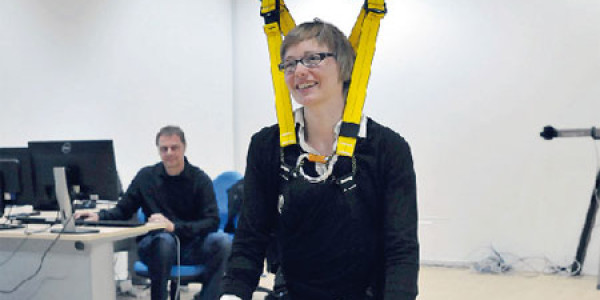3D body-weight support system demonstrated (Wam) / 22 April 2013 Khalifa University researchers demonstrated on the Abu Dhabi campus on Sunday a 3D body-weight support system for over-ground gait training, which helps study balance in both patients and healthy people alike. Developed by Dr Heike Vallery, during her tenure as Assistant Professor of Biomedical Engineering at the university, and a number of other researchers from leading European universities, the robotic system FLOAT (Free Levitation for Overground Active Training) is a support system that is designed to precisely control forces acting on a human subject in both vertical and horizontal directions. Patients can move in a large 3D space (8m length x 2m width x 2.8m height), so that diverse activities can be trained, such as walking or stair climbing. This system allows individuals to reduce their own body weight by an arbitrary amount (for example, to emulate walking on the moon), and it can also assist or perturb balance for training purposes. Combined with the lab’s state-of-the-art equipment for gait analysis, this system will enable cutting-edge research on human gait and balance in healthy subjects and patients. “We are thrilled to see this new lab coming online, thanks to the dedication of our researchers”, said Dr Mohammed Al Mualla, Khalifa University’s Senior Vice-President for Research and Development. “Labs like this will not only provide our students and faculty with an innovative environment to significantly advance their research, but it will also be a great complement to the state-of-the-art research facilities that Khalifa University is dedicated to providing. The research produced at the university is regionally relevant and serves the specific needs of the UAE’s development as a knowledge-intensive society.” The FLOAT enables transparent support for over-ground gait training in a large 3D workspace, due to its low apparent mass. The next steps will be further improvements to the controller and tests with patients. The laboratory will also facilitate collaboration with local clinicians to provide rehabilitation and therapy that will improve the health of the UAE population. Dr Vallery is collaborating with a Swiss-based research team that made headlines last year when they used a combination of electrochemical stimulation and rehabilitation training to allow paralysed rats to walk again. The team surgically modified a group of rats by partially severing their spinal cords at two different levels. The intention was to remove all direct nerve connections to the hind legs. Then, the researchers trained the rats using a robotic support device in combination with pharmacological intervention and stimulation of the spinal cord, until the rats regained stepping capability. Now, the FLOAT will bring this research to a new level, by enabling studies with human subjects that suffered an injury to the spinal cord. Taylor Scott International
3D body-weight support system demonstrated

This entry was posted in Investment, investments, News, Taylor Scott International, TSI and tagged investments. Bookmark the permalink.







